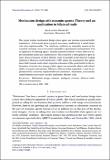Mechanism design with maxmin agents: Theory and an application to bilateral trade
Author(s)
Wolitzky, Alexander G.
DownloadMechanism design.pdf (473.1Kb)
PUBLISHER_CC
Publisher with Creative Commons License
Creative Commons Attribution
Terms of use
Metadata
Show full item recordAbstract
This paper studies mechanism design when agents are maxmin expected utility maximizers. A first result gives a general necessary condition for a social choice rule to be implementable. The condition combines an inequality version of the standard envelope characterization of payoffs in quasilinear environments with an approach for relating agents' maxmin expected utilities to their objective expected utilities under any common prior. The condition is then applied to give an exact characterization of when efficient trade is possible in the bilateral trading problem of Myerson and Satterthwaite, 1983, under the assumption that agents know little beyond each other's expected valuation of the good (which is the information structure that emerges when agents are uncertain about each other's ability to acquire information). Whenever efficient trade is possible, it may be implemented by a relatively simple double auction format. Sometimes, an extremely simple reference price rule can also implement efficient trade.
Date issued
2016-09Department
Massachusetts Institute of Technology. Department of EconomicsJournal
Theoretical Economics
Publisher
The Econometric Society
Citation
Wolitzky, Alexander. “Mechanism Design with Maxmin Agents: Theory and an Application to Bilateral Trade.” Theoretical Economics 11, no. 3 (September 2016): 971–1004 © 2016 Alexander Wolitzky
Version: Final published version
ISSN
1933-6837
1555-7561